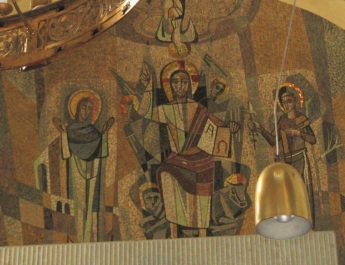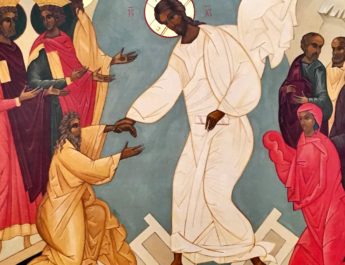Amos 5:6-7, 10-15
Ordinary B46
A “seek” = darash. This is seek, ask, inquire, care for. Generally it means following in pursuit or following as part of a search, which implies seeking or asking. Also used specially to mean worship.
B “Lord” = YHVH. From havah (to be, become) or hayah (to come to pass, become, be). This is the name of the God of Israel, the self-existent and eternal one, the tetragrammaton. This pronunciation has been lost to time so “Lord” is generally used in its place.
C “live” = chayah. This is to live or keep alive in a literal or figurative sense. So, it an be revive, nourish, or save.
orD he will break outE against the houseF of JosephG like fire,H
and it will devourI Bethel,J with no one to quenchK it.
D “or” = pen. Perhaps from panah (to turn, face, appear). This is lest, if, or.
E “break out” = tsalach. This is pushing forward in a literal or figurative sense. So it could be to break out, to come mightily, to rush, to go over. Figuratively, it could mean to prosper.
F “house” = bayit. Probably from banah (to build, make, set up, obtain children; to build literally or figuratively). This is house, court, family, palace, temple.
G “Joseph” = Yoseph. From yasaph (to add, increase, continue, exceed). This is Joseph, meaning “he increases” or “let him add.”
H “fire” = esh. This is fire, burning, flaming, hot. It is fire in a literal or figurative sense.
I “devour” = akal. This is to eat, devour, burn up, or otherwise consume. It can be eating in a literal or figurative sense
J “Bethel” = Betheel. Related to “house” in v6. From bayit (see note F above) + el (God, a god). This is Bethel, literally meaning “house of God.”
K “quench” = kabah. This is to quench or extinguish. It could refer to a fire or to anger.
7 Ah, you that turnL justiceM to wormwood,N
L “turn” = haphak. This is to turn, overturn, change, return, turn over, pervert.
M “justice” = mishpat. From shaphat (to judge, defend, pronounce judgment, condemn, govern). This is a verdict or formal sentence whether from humans or from God. It includes the act of judging as well as the place that judging takes place, the suit itself, and the penalty. Abstractly, this is justice, which includes the rights of the participants.
N “wormwood” = laanah. 8x in OT. May come from a word that means to curse. This is wormwood or hemlock.
and bringO righteousnessP to the ground!Q
O “bring” = yanach. Perhaps from the same as nuach (to rest, calm, camp, free, place, remain, satisfy, settle, station, or wait; implies settling down in a literal or figurative sense). This is to lay down, let alone, pacify, cast down, or deposit. It can also mean to allow something or someone to stay.
P “righteousness” = tsedaqah. From the same as tsedeq (rightness, righteousness, vindication. It is everything that is just or ethical. That which is right in a natural, moral, or legal sense. It also includes just weights (i.e. true weights). Figuratively, this is justice, righteousness, equity – even prosperity). This is righteousness, justice, righteous acts, and moral virtue.
Q “ground” = erets. Root may mean to be firm. This is earth, ground, field land, or country.
10 They hateR the one who reprovesS in the gate,T
R “hate” = sane. This is an enemy or foe. It is one that is hated with a personal hatred.
S “reproves” = yakach. This is to decide, be right, argue, or convince. It can also be to decide, convict, reason together, or reprove.
T “gate” = shaar. May be related to sha’ar (to calculate or reckon; may come from a root that means to open up or split). This is a gate, door, or other opening like a port.
and they abhorU the one who speaksV the truth.W
U “abhor” = taab. From toebah (abomination, loathsome, something morally disgusting or abhorrent). This is to abhor, despise, to reject, to act abominably.
V “speaks” = dabar. This is generally to speak, answer, declare, or command. It might mean to arrange and so to speak in a figurative sense as arranging words.
W “truth” = tamim. From tamam (to finish or accomplish; to make perfect, demonstrate that you are upright; consume; to complete in a literal or figurative sense). This is entire in a literal or figurative sense. So, it could be complete, full, intact, or without defect. Alternately, it could refer to being sound, having integrity, being sincere or perfect.
11 ThereforeX becauseY you trampleZ on the poorAA
X “therefore” = ken. Perhaps from kun (properly, in a perpendicular position; literally, to establish, fix, fasten, prepare; figuratively, it is certainty, to be firm, faithfulness, render sure or prosperous). This is to set upright. Generally used figuratively to mean thus, so, afterwards, rightly so.
Y “because” = yaan. From anah (to answer, respond, announce, sing, shout, or testify; to pay attention, which implies responding and, by extension, starting to talk; singing, shouting, testifying, etc.). This is because, since, for the sake of, giving a reason.
Z “trample” = bashas. 1x in OT. This is to trample or to charge steep rent.
AA “poor” = dal. From dalal (to be low, hang, fade, be emptied, become poor, be oppressed). This is lean, weak, needy, poor. Properly, it is one who is dangling.
and takeBB from them leviesCC of grain,DD
you have builtEE houses of hewn stone,FF
but you shall not liveGG in them;
BB “take” = laqach. This is to take, accept, carry away, receive. It can also have the sense of take a wife or take in marriage.
CC “levies” = maseth. 16x in OT. From nasa (to lift in a broad sense, literally and figuratively; to carry, take, or arise; to bring forth, advance, accept). This is an utterance, lifting up, collection, uprising, a rising flame or beacon, a present lifted up, a mess, reproach, or burden.
DD “grain” = bar. 14x in OT. From barar (to select, polish, cleanse, brighten, purify). This is something that is winnowed so any kind of grain, whether in the field or harvested. It can be corn, wheat, or other grains. This can also refer to a field or the open country.
EE “built” = banah. Related to “house” and “Bethel” in v6. See note F above.
FF “hewn stone” = gazith. 11x in OT. This is something cut like a smooth or hewn stone.
GG “live” = yashab. This is to sit and so to remain and so to dwell. It is sitting for any reason – as a judge, in order to ambush, or just sitting quietly. Causatively, this can mean settling or marrying. This can also mean continue, endure, or establish.
you have plantedHH pleasantII vineyards,JJ
but you shall not drinkKK their wine.LL
HH “planted” = nata. To fix or fasten, establish or plant. This is planting in a literal or figurative sense.
II “pleasant” = chemed. 6x in OT. From chamad (to desire or delight in someone or something; something that is precious or coveted; to lust). This is desire, delight, handsome, or pleasant. It is used to describe fields, vineyards, and men.
JJ “vineyards” = kerem. This is a vineyard, garden, vines, or a vintage.
KK “drink” = shathah. This is to drink literally or figuratively. It could also be a drinker.
LL “wine” = yayin. Root may mean to effervesce, referring to the fermentation process. This is wine, grape, or banquet. It can imply intoxication.
12 For I knowMM how manyNN are your transgressions,OO
and how greatPP are your sinsQQ—
MM “know” = yada. This is to know, acknowledge, advise, answer, be aware, be acquainted with. Properly, this is to figure something out by seeing. It includes ideas of observation, recognition, and care about something. It can be used causatively for instruction, designation, and punishment.
NN “many” = rab. From rabab (increasing in any aspect whether quantity, authority, size, quality, greatness, etc.). This is abundance, many, elder, exceedingly, great. It refers to abundance of amount, rank, or status.
OO “transgressions” = pesha. From pasha (to rebel, offend, quarrel; making a break from proper authority so can also refer to an apostate). This is transgression, rebellion, or sin. It could be a revolt on a national scale or an individual moral one.
PP “great” = atsum. From atsom (to be many or mighty; could also refer to breaking bones). This is mighty or mighty one. It means powerful, which implies large numbers.
QQ “sins” = chatta’ah. From chata’ (to miss or go wrong and so to sin, bear the blame; it can also include the sense of forfeiting or lacking). This is sin itself as well as punishment for sin. It is sometimes used specifically to refer to sin that is habitual.
you who afflictRR the righteous,SS who take a bribe,TT
and push asideUU the needyVV in the gate.
RR “afflict” = tsarar. This is to bind, restrict, narrow, be cramped, an adversary.
SS “righteous” = tsaddiq. Related to “righteousness” in v9. From the same as tsedeq (see note P above). This is just, innocent, righteous, righteous one, or lawful.
TT “bribe” = kopher. 17x in OT– including covering Noah’s ark with pitch in Genesis 6. From kaphar (to appease, cover, pacify, cancel, cleanse, pardon). This is ransom, bribe, price of a life. Properly, it means something that covers something else. So, it can be a village, bitumen as a coating, a henna plant that dyes, or a ransom price.
UU “push aside” = natah. This is to stretch or spread out, to extend, or bend. In can also imply moral deflection.
VV “needy” = ebyon. From abah (to consent, obey, want, yield, accept). This is needy, poor, beggar. Someone who is wanting.
13 Therefore the prudentWW will keep silentXX in such a time;YY
for it is an evilZZ time.
14 Seek goodAAA and not evil,
that you may live;
WW “prudent” = sakal. This is to consider or be prudent and so it can mean to instruct or be an expert. It can also mean dealing prudently, which implies success and prospering. This verb presumes intelligence of the subject. In one form of the verb, it can mean laying cross-wise.
XX “keep silent” = damam. This is to cease, be or become mute, silent, still, cut off, hold peace, be astonished, or die.
YY “time” = eth. Related to “because” in v11. Probably from anah (see note Y above). This is a period or season. It can also mean whenever or continually.
ZZ “evil” = ra’. From ra’a’ (to be evil, bad, afflict; properly, to spoil – to destroy by breaking into pieces; figuratively, to cause something to be worthless; this is bad in a physical, social, or moral sense; that which displeases, to do harm or mischief, to punish or vex). This is bad, disagreeable, that which causes pain, misery, something having little or no value, something that is ethically bad, wicked, injury, calamity. This refers to anything that is not what it ought to be – a natural disaster, a disfigurement, an injury, a sin.
AAA “good” = tob. From tob (to be pleasing, to be good). This is good, beautiful, pleasant, agreeable, bountiful, at ease. This word is used for goodness as a concept, a good thing, a good person. This can refer to prosperity and welfare as well as joy, kindness, sweetness, and graciousness. So, this is ethically good, but also enjoyably good.
and soBBB the Lord,CCC the GodDDD of hosts,EEE will beFFF with you,
just as you have said.
BBB “so” = ken. Same as “therefore” in v11. See note X above.
CCC “Lord” = YHVH. Related to “Lord” in v6 & “be” in v14. Same meaning as “Lord” in v6 with a different vowel pointing. See note B above.
DDD “God” = Elohim. Related to “Bethel” in v6. See note J above.
EEE “hosts” = tsaba. From tsaba (to wage war, serve, assemble, fight, perform, muster, wait on). This is a large group of persons (used figuratively for a group of things). It implies a campaign literally as with army, war, warfare, battle, company, soldiers. Can also be used figuratively for hardship or for worship.
FFF “be” = hayah. Related to “Lord” in v6. See note B above.
15 Hate evil and loveGGG good,
and establishHHH justice in the gate;
it may be that the Lord, the God of hosts,
will be graciousIII to the remnantJJJ of Joseph.
GGG “love” = aheb. This is to love, beloved, friend. It is to have affection for sexually or otherwise.
HHH “establish” = yatsag. 16x in OT. This is to set, establish, present, stay. It can imply putting something somewhere permanently.
III “be gracious” = chanan. This is to beseech, show favor, be gracious. Properly, it is to bend in kindness to someone with less status.
JJJ “remnant” = sheerith. From shaar (properly, swelling up i.e. being left over; a remnant, remaining, being redundant). This is a remainder, residue, or survivor. It can also refer to posterity.
Image credit: “artemisia absinthium” by SalTheColourGeek, 2014.




